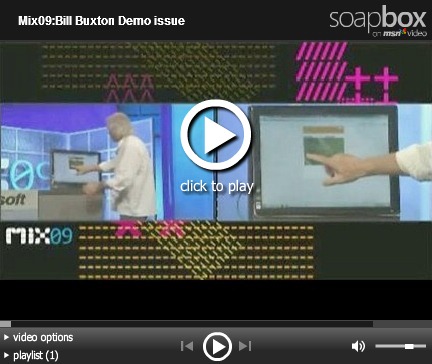Presentation tip: They Remember the Mistakes more than the Polish
Update: See the full list of PM Tips.
One of the reasons I love going to Mix is getting a chance to watch really world-class technical speakers. As I watched the keynote and a few sessions this year one theme really stood out to me: The audience seems to remember how the speaker handles their mistakes\crashes more than the content of their presentations! Obviously it this is a pretty hard thing for a speaker to prepare for. If you can prepaid for it, then I’d suggest avoiding it all together ;-). So how do you prepare for the unprepareable? It seems to me it is all about attitude.
For me, my learning on this started when I arrived a day early for Mix. I had a chance to talk to one of my favorite speaking coach Richard Klees. If you have not had this guy rip you to shreds, you need to! I had the good fortunate to have an error pop up during my talk with Richard – FireFox popped up and wanted to update the browser in the middle of my presentation. I was clearly annoyed and frustrated by this interruption in my carefully planned flow. Richard called me on it and strongly suggested I work on my attitude.
I partially understood his advice, but I didn’t really internalize it until the keynote when Bill Buxton could not get his HP Touch Smart to respond.
Notice how he handled this – so much grace.. I had the good fortunate of seeing this demo during a dry run the night before, so I can say with some confidence Bill got more applause with his quick wit and good humor than if he had actually been able to do the demo.
So that got me really thinking.. I immediately went back to Richard's advice and it started to make more sense. Later in the keynote I was very attentively watching ScottGu’s coding demo.. My team had worked with him a lot of getting this demo just right and crisp.. and being pre-release software I was a little nervous of what bugs we might see so I was a little on the edge of my seat during this demo. And Of course he did hit an issue, but notice how gracefully he handled it?
Scott had been through this demo 100s of times in the previous 24-48 hours and trust me, he never saw this issue.. yet he handled it perfectly! He came across as more real and human. Again, I thought back to Richard's advice, I was really starting to understand…
Just a few hours later, I would get a chance to put into practice my new found wisdom. I was doing 75 mins worth of demo on preview software on to of a random daily build of Win7. Let’s see how I handled it..
So maybe not as good as the masters, but way better than I would have done without the active learning going on. It is all about the presenters attitude and state of mind.
Have you seen some great presentation failures? How about great recoveries?
Comments
Anonymous
March 27, 2009
The comment has been removedAnonymous
March 27, 2009
"That must be why we're not shipping Windows 98 yet." http://www.youtube.com/watch?v=UjZQGRATlwA Watching this clip always brings a smile to my face. I think you're absolutely right, Brad. The presenter's response to things that derail the presentation - whether they're failing demos, A/V problems, members of the audience asking questions (sometimes in a good way, sometimes not) - is important. It can easily make a strong impression, good or bad. Handling these things well is one of the characteristics of a great presenter. As an attendee, I really appreciate it when the presenter is well prepared and able to keep things moving along no matter what happens. I've seen some presenters go down with the ship when their demo fails, and it's NOT pretty. Let it go. I'd rather hear you describe what would've happened, instead of seeing you try to debug on the fly (which sometimes ends well but usually not). Maybe the worst is when the audience gets involved in trying to help debug, and ends up wasting more and more of everyone's time leading the presenter down a futile path. It hurts just remembering seeing this happen to someone.Anonymous
March 27, 2009
On a similar note, though apocryphal, the great violinist Paginini used to fray one of his strings so that it would break during a concert. On the fly he would seamlessly transpose the piece to the remaining strings without dropping a note and amazing the audience with his apparent incredible skill and grace under pressure.Anonymous
March 27, 2009
One of the reasons I love going to Mix is getting a chance to watch really world-class technical speakersAnonymous
March 27, 2009
I noticed all you guys recovering from those problems. While Bill's was just great, I think you all handled it well. I've seen speakers whine and stomp, and it just ruins the mood in the room. It's really hard to control the response, but I thought you all did well. (and better than I would have!) :) PeteAnonymous
March 27, 2009
As a speaker you always feel people are missing something when you cannot show it. But the thing is, the audience doesn't know what you want to show, so leaving something out doesn't hurt. It does hurt however when you clearly show you are leaving something out by trying very hard to demo it. Bill Buxton didn't -and- made a joke as a bonus. That's why his response is so good in my view.Anonymous
March 29, 2009
The comment has been removedAnonymous
March 30, 2009
I thought you played it rather well. Throwing in some quick, witty humor ("here's Win 7's task manager, I wanted to show you that...") to disarm the situation was well played.Anonymous
April 09, 2009
This is a circumstance every presenter who includes a demo has been through at one time or another. I have written a blog on another option for enhancing your "recovery." It will post on April 15th.Anonymous
June 01, 2009
You made it look like you're still having fun, that's what it's all about, keep the positive mood. Your presentations are my favorites, they are fun and stress free.Anonymous
June 24, 2009
The comment has been removedAnonymous
June 25, 2009
The comment has been removed


